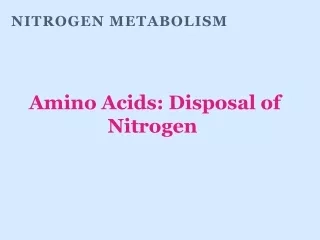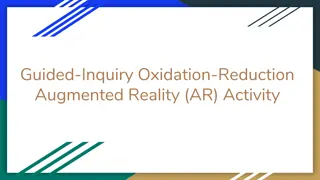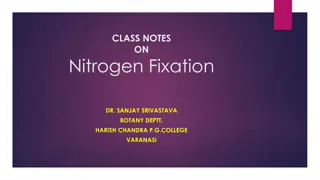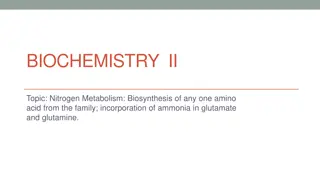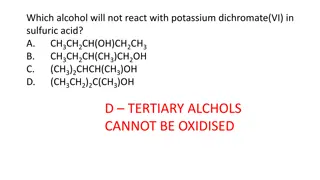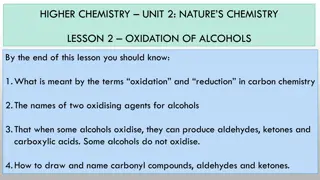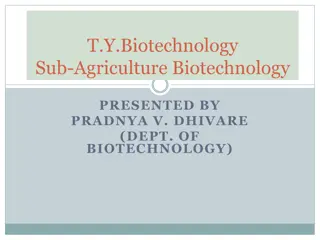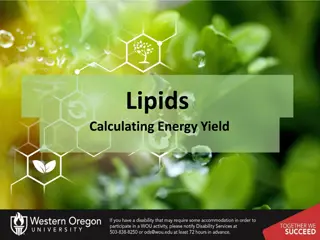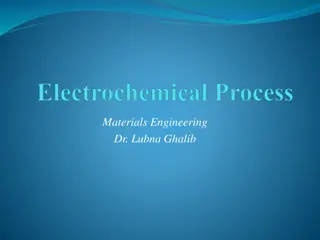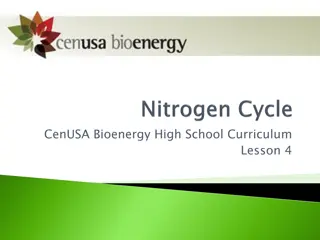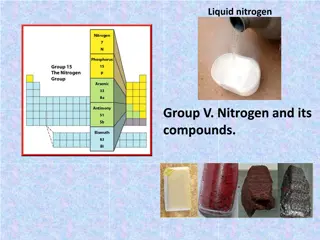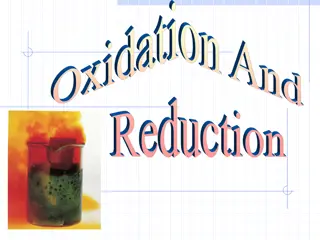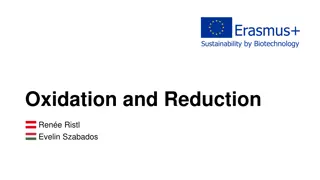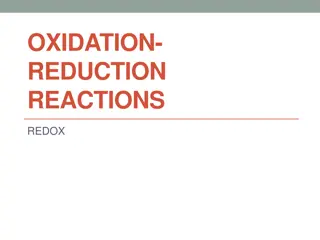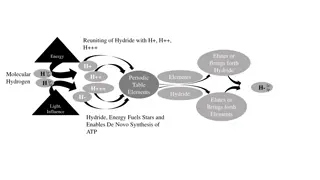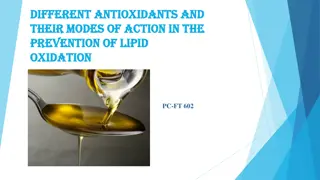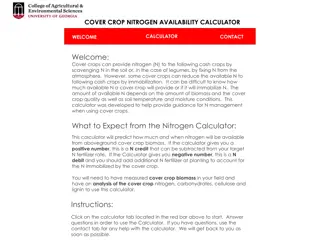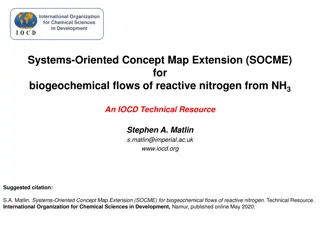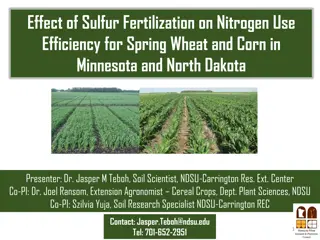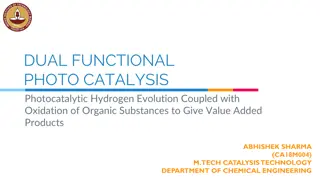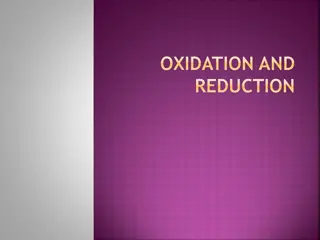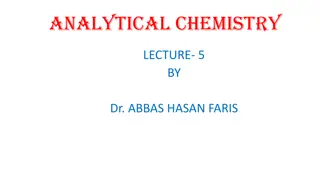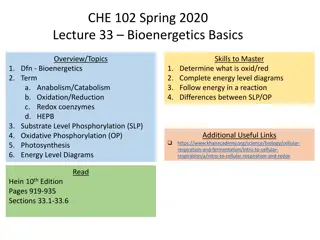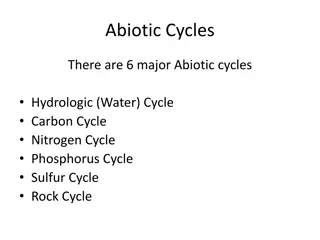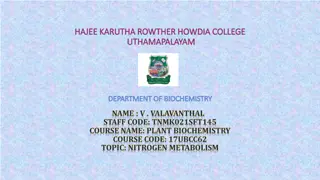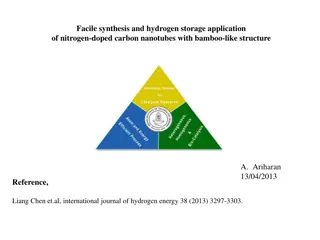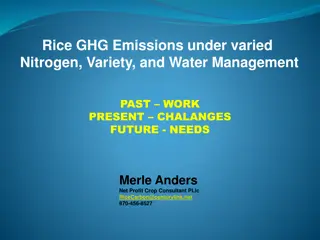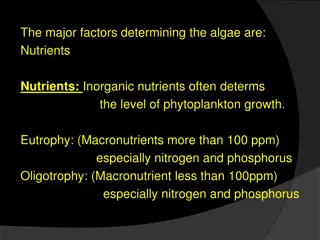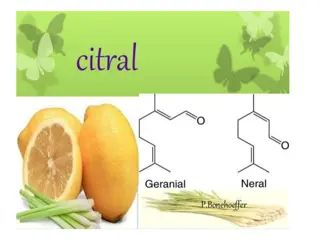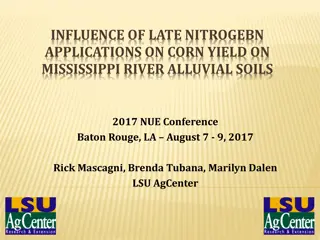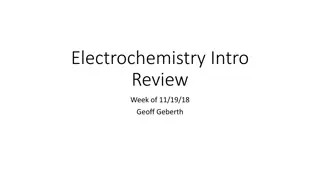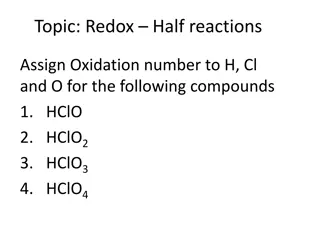Amino Acids: Disposal of Nitrogen
Overview of nitrogen metabolism with a focus on the disposal of nitrogen through amino acid catabolism. It explains the process of removing the α-amino groups from amino acids, the synthesis of urea, and the conversion of carbon skeletons to energy-producing pathways.
36 views • 65 slides
Augmented Reality Oxidation-Reduction Activity Breakout Session
Engage in an interactive guided inquiry session on oxidation-reduction reactions using augmented reality technology. The session includes team tasks and discussions related to lithium-ion electric car batteries, with designated roles for each member. Participants will access Google Docs for collabor
10 views • 8 slides
Understanding Nitrogen Fixation Process in Plants
Nitrogen fixation is the conversion of atmospheric nitrogen into ammonia or nitrates by bacteria or industrial processes for plant absorption. Biological and abiological methods exist, with various bacteria and cyanobacteria involved in the process. Symbiotic relationships between these organisms an
1 views • 10 slides
Understanding Nitrogen Metabolism: Amino Acid Biosynthesis and Ammonia Incorporation
Nitrogen metabolism is crucial in the biosynthesis of amino acids such as glutamate and glutamine, incorporating ammonia for various physiological processes. Ammonia is efficiently transported and stored using compounds like alanine and glutamate, playing a key role in the urea cycle. Glutamate, a v
0 views • 22 slides
Organic Chemistry Reactions Overview
This content covers various aspects of organic chemistry reactions, including the oxidation of alcohols with potassium dichromate, the solubility of molecules in water, and the oxidation of propan-1-ol to form aldehydes or carboxylic acids. It also explores the oxidation of butan-2-ol and the suitab
1 views • 9 slides
Understanding Oxidation of Alcohols in Carbon Chemistry
Oxidation of alcohols involves either adding oxygen or removing hydrogen in carbon compounds, leading to the production of aldehydes, ketones, and carboxylic acids. Primary alcohols can oxidize further to produce aldehydes and carboxylic acids, while secondary alcohols form ketones. Tertiary alcohol
1 views • 13 slides
Nitrogen Fixation and Symbiotic Relationship in Agriculture
Nitrogen fixation is a crucial process where nitrogen is converted into ammonia by nitrogen-fixing bacteria, benefiting plants like legumes. Symbiotic nitrogen fixation involves a mutualistic exchange between plants and bacteria, exemplified by Rhizobium species. This symbiosis leads to the conversi
0 views • 15 slides
Energy Yield from Lipid Oxidation Process
Understanding the energy generation process from lipid oxidation involves the conversion of fatty acids into Acetyl-CoA through multiple rounds of oxidation, which then enter the Krebs cycle to produce ATP. Each round of oxidation results in the production of Acetyl-CoA, NADH, FADH2, and net gains o
0 views • 7 slides
Understanding Electrochemical Processes in Materials Engineering
Electrochemical processes play a crucial role in materials engineering, specifically in the context of corrosion. These processes involve both oxidation (anodic reaction) and reduction (cathodic reaction) reactions occurring simultaneously. Maintaining a balance between these reactions is essential
3 views • 22 slides
Understanding the Nitrogen Cycle and Erosion Process
Nitrogen, a vital element found in living and non-living things, plays a key role in the nitrogen cycle where it moves between organisms and the environment. However, human activities like using nitrogen-rich fertilizers can lead to environmental issues like waterway pollution. In addition, the proc
2 views • 6 slides
Understanding Nitrogen: Properties, Reactions, and Applications
Nitrogen, a colorless and odorless gas, is a vital element present in air and plays a crucial role in various chemical reactions. Known for its unreactive nature due to strong bonds, nitrogen is used in the manufacture of ammonia, fertilizers, and organic compounds. Discover how nitrogen is prepared
0 views • 43 slides
Understanding Oxidation Numbers in Chemistry
Oxidation is a process where atoms or ions gain a more positive oxidation state, while reduction involves attaining a more negative oxidation state. This informative content explains oxidation numbers, uncombined elements, monoatomic ions, and oxidation rules in compounds. Practice determining oxida
5 views • 5 slides
Understanding Oxidation and Reduction in Biotechnology through Erasmus+ Sustainability
Explore the concept of oxidation and reduction in biotechnology with the help of Erasmus+ Sustainability, discussing electron donation, electron acceptance, oxidation numbers, and calculation examples. Learn how these processes work together for sustainable biotechnological applications.
0 views • 5 slides
Understanding Alcohol Oxidation in Organic Chemistry
Explore the oxidation of alcohols in organic chemistry through a series of experiments involving primary, secondary, and tertiary alcohols. Learn how different alcohols react and identify the products of oxidation reactions. Understand the distinctions between aldehydes, ketones, and the classificat
0 views • 31 slides
Surface Water-Groundwater Interactions and Nitrogen Cycling in a Tidally Influenced River Study
Study on the dynamic interactions between surface water and groundwater in a tidal river, focusing on nitrogen cycling. The research highlights the impact of tidal fluctuations on bank storage, nitrogen transformation, and nutrient cycling. Findings suggest that river discharge affects the exchange
1 views • 16 slides
Understanding Oxidation-Reduction Reactions in Chemistry
Explore the concept of oxidation and reduction in chemistry, which are fundamental processes that occur simultaneously in oxidation-reduction reactions. Learn about the role of oxygen, different types of oxidation reactions beyond burning, such as bleaching stains, and the concept of reduction invol
0 views • 34 slides
Maximizing Nitrogen Efficiency in In-Season Applications
This study explores the timing of in-season nitrogen applications in agriculture to optimize yield and minimize nitrogen loss. Results show that early application is crucial to reduce nitrogen loss susceptibility. The research includes key plant growth stages, such as physiological maturity and side
0 views • 30 slides
The Intricate Pathways of Choline Synthesis and Oxidation in Molecular Biology
Delve into the complex processes of choline synthesis and oxidation pathways, involving the integration of hydride ions and various molecules, essential for the production of phosphatidylcholine and other crucial compounds in biological systems. Learn about the enzymes and mechanisms that drive the
1 views • 11 slides
Evolution of N-Rich Strip Adoption in N Management
The adoption of N-Rich Strip has transformed nitrogen management practices over the years. Starting from small applications in 2003 to widespread utilization across acres in Oklahoma and Kansas, the confidence in this approach has grown significantly. Farmers are advised to monitor N-rich strips and
0 views • 17 slides
Understanding Antioxidants and Their Role in Preventing Lipid Oxidation
Lipid oxidation is a crucial chemical process affecting the quality of fats and oils, leading to off-flavors and toxicity. Antioxidants play a vital role in delaying this oxidation process by scavenging free radicals through mechanisms like free radical scavenging. They help prolong the shelf life a
0 views • 12 slides
Cover Crop Nitrogen Availability Calculator
Cover crops can impact nitrogen availability for cash crops. This calculator helps estimate nitrogen availability from cover crop biomass, guiding N management decisions. It requires data on cover crop biomass and composition. Positive values suggest a nitrogen credit, while negative values indicate
0 views • 7 slides
Systems-Oriented Concept Map Extension for Reactive Nitrogen Flows
International Organization for Chemical Sciences in Development presents a Systems-Oriented Concept Map Extension (SOCME) focusing on biogeochemical flows of reactive nitrogen from NH3. The concept explores core reaction subsystems, energy input subsystems, equilibrium conditions, and the integratio
0 views • 11 slides
Effect of Microgravity on Nitrogen Fixation in Red Clover Study
Investigating the impact of microgravity on nitrogen fixation in red clover at Johnson County Central High School in Tecumseh, NE. The experiment aims to determine if clover exposed to space conditions fixates nitrogen similar to Earth conditions, crucial for growing food in space. Hypothesis, exper
0 views • 8 slides
Understanding Biological Oxidation-Reduction Reactions and Coenzymes
Explore the fascinating world of biological oxidation-reduction reactions catalyzed by oxidoreductases. Coenzymes play a crucial role in these processes, facilitating the transfer of hydrogen atoms. NAD+ is a well-known coenzyme involved in accepting and donating hydrogen. Witness the oxidation of e
0 views • 13 slides
Effect of Sulfur Fertilization on Nitrogen Use Efficiency for Spring Wheat and Corn
This research project, conducted by Dr. Jasper M. Teboh and his team at NDSU, investigates the impact of sulfur fertilization on nitrogen use efficiency for spring wheat and corn in Minnesota and North Dakota. The study aims to determine if wheat or corn respond to sulfur application, how sulfur aff
0 views • 25 slides
Understanding Fatty Acid Oxidation in Zoology Department with Miss Punam Patil
Explore the process of fatty acid oxidation in zoology, including the entry of fatty acids into mitochondria, TCA cycle outcomes, and differences between mitochondrial and peroxisomal oxidation. Learn about the oxidation of saturated, monounsaturated, and polyunsaturated fatty acids through detailed
0 views • 9 slides
Dual-Functional Photo Catalysis: Hydrogen Evolution & Organic Oxidation
The research explores dual-functional photo catalysis, combining hydrogen evolution with the oxidation of organic substances to produce value-added products. It focuses on utilizing photoelectricity to create electrons for hydrogen production and organic molecule oxidation. The study investigates th
0 views • 14 slides
Understanding Oxidation and Reduction Reactions in Chemistry
Dive into the world of oxidation and reduction reactions through displacement reactions and ionic equations. Explore how atoms turn into ions, learn about spectator ions, balance electrons in half equations, and grasp the definitions of oxidation and reduction (OILRIG). Discover which elements are o
0 views • 11 slides
Understanding Oxidation-Reduction Reactions in Analytical Chemistry
Oxidation-reduction reactions play a crucial role in various chemical processes, including photosynthesis and corrosion. This content delves into the basics of redox reactions, explaining how electrons are transferred between reactants, leading to changes in oxidation numbers. Examples such as the r
0 views • 10 slides
Bioenergetics Basics: Overview, Topics & Energy Diagrams
The content covers the fundamentals of bioenergetics, including topics like anabolism, catabolism, oxidation, reduction, redox coenzymes, substrate-level phosphorylation, oxidative phosphorylation, and photosynthesis. It also explores energy level diagrams, metabolism, oxidation-reduction reactions,
0 views • 21 slides
Microbial Transformations of Nitrogen in Soil: Factors, Forms, and Impact on Plant Nutrition
Understanding the microbial transformations of nitrogen in soil is crucial for optimizing plant nutrition. Factors such as climate, water supply, cultivation, soil texture, and depth influence the nitrogen content in soil. The different forms of soil nitrogen, including inorganic and organic compoun
0 views • 23 slides
Understanding Abiotic Cycles in Ecosystems: Hydrologic, Carbon, Nitrogen, and More
Abiotic cycles play a crucial role in regulating ecosystems. The hydrologic cycle involves processes like evaporation, condensation, precipitation, and transpiration. The carbon cycle relies on photosynthesis, respiration, and human activities like deforestation and burning fossil fuels. The nitroge
0 views • 20 slides
The Role of Nitrogen in Plant Biochemistry: Understanding Nitrogen Metabolism
Nitrogen is a crucial element in plant biochemistry, essential for protein synthesis and the formation of various organic compounds. This article explores the sources of nitrogen available to plants, including atmospheric nitrogen, nitrates, and organic nitrogen compounds. The importance of nitrogen
0 views • 15 slides
Nitrogen-Doped Carbon Nanotubes for Hydrogen Storage
Hydrogen is a promising energy carrier for the future, and efficient storage under ambient conditions is a key challenge. Nitrogen-doped carbon nanotubes show potential due to their unique structure and chemical properties. This study focuses on the facile synthesis and hydrogen storage application
0 views • 12 slides
Rice GHG Emissions under Varied Nitrogen, Variety, and Water Management Study in Arkansas
Detailed study on rice greenhouse gas emissions under varied nitrogen, variety, and water management treatments, focusing on nitrogen fertility, crop varieties, and water usage impact on methane and nitrous oxide emissions. Research examines optimal nitrogen rates for reduced global warming potentia
1 views • 18 slides
Factors Influencing Algae Growth in Water Ecosystems
Nutrients play a crucial role in algae growth, with inorganic nutrients like nitrogen and phosphorus being key factors. Algae require macroelements such as carbon, hydrogen, oxygen, sulfur, potassium, calcium, phosphorus, and nitrogen in large quantities, as well as microelements like iron, manganes
0 views • 16 slides
Citral Oxidation and Reduction Reactions in Organic Chemistry
The oxidation of citral with moist Ag2O yields geranic acid with the same number of carbon atoms. On the other hand, reduction of citral with Na-amalgam in dilute acid results in the formation of a primary alcohol. These reactions showcase important transformations in organic chemistry, specifically
0 views • 12 slides
Influence of Late Nitrogen Applications on Corn Yield on Mississippi River Alluvial Soils - 2017 NUE Conference
Excessive rainfall in the lower Mississippi Delta can lead to late-season nitrogen deficiency in corn crops. Research conducted at the LSU AgCenter focused on evaluating the efficacy of supplemental nitrogen at late growth stages on Mississippi River alluvial soils. Field experiments from 2006 to 20
0 views • 19 slides
Understanding Electrochemistry: A Comprehensive Overview
Dive into the world of electrochemistry with this detailed review covering topics such as oxidation, reduction, half-reactions, and the significance of oxidation numbers in balancing redox equations. Explore key concepts like OIL RIG (Oxidation Is Loss, Reduction Is Gain) and learn how to apply elec
0 views • 17 slides
Understanding Redox Half Reactions: Assigning Oxidation Numbers and Half-Reactions
In this content, we explore assigning oxidation numbers to elements in compounds such as HClO, HClO2, HClO3, and HClO4. We then delve into the Haber Process to understand redox reactions. The concept of oxidation and reduction, as well as the significance of electrons in these reactions, is illustra
0 views • 20 slides
